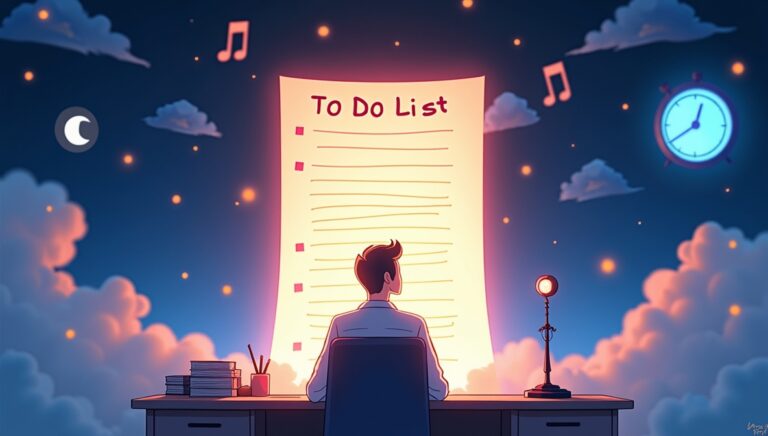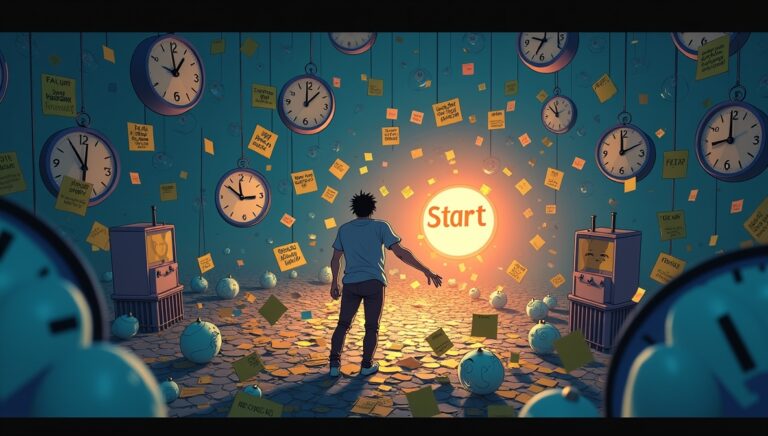
You have something to do and plenty of time to do it, yet you keep putting it off.
That blank page looks even emptier the longer you stare at it. That blank canvas? Somehow even more intimidating. And that messy room? Well, it’s not cleaning itself anytime soon.
We’ve all been there. Worse yet, we don’t even enjoy the extra time we gained from procrastinating. Guilt piles up, stress increases, and suddenly, we’re stuck in our own heads. The more we delay, the harder it gets to start.
If that sounds familiar, don’t worry, I’ve been there too. I would like to share some science based tips I learned the hard way on how to overcome procrastination for good! Here are the best research-backed strategies to help you stop procrastinating and never look back again!
Why Do We Procrastinate? (It’s Not Just Laziness!)
First, let’s get one thing straight—procrastination isn’t fulfilling. It doesn’t make us happy, and it doesn’t make us comfortable. So why do we keep doing it?!

1- Fear of Failure
During a therapy session, my therapist told me I have a “perfectionist-guilty” schema—a mental structure that shapes how I process information. Schemas (or schemata) are the building blocks of knowledge, developed through our interactions with the world.
At first, I was almost proud of this. At least now, I wouldn’t be lying in a job interview when I say, “My biggest weakness? Perfectionism.” But then, my therapist explained how perfectionism can actually hold me back—stopping me from even starting something important out of fear that it won’t be perfect. Ironically, this means I end up failing before I even begin which leads me to feeling guilty.
2- Lack of Motivation
If we go strictly by science, procrastination can sometimes be explained by low dopamine levels. But motivation isn’t just about brain chemistry, it’s multifactorial and depends on many things.
The key difference? Intrinsic vs. extrinsic motivation.
Intrinsic motivation comes from within. You do something because you genuinely enjoy or value it.
Extrinsic motivation comes from outside rewards or pressures, like deadlines, grades, or social expectations.
Now, you might be thinking: “But I have homework, work tasks, and responsibilities. I can’t just rely on intrinsic motivation. What should I do?”
That’s where discipline, routines, and rituals come in. We’ll get into that later!
3. Overwhelm & Decision Paralysis
Ever tried to pick a movie on Netflix? You set everything up, comfy blanket, snacks, dim lights. Only to get stuck scrolling through too many choices. You watch trailers, skip options, and before you know it… you end up watching nothing at all.
This is decision paralysis at work. The same thing happens when:
You postpone choosing a thesis topic because there are too many options.
You put off writing an article because you feel like you need to read every book on the topic first.
When there’s too much information to process, our brains freeze. Instead of making progress, we end up stuck in analysis mode.
4. Thrill-Seeking
Some people seek an adrenaline rush by skydiving or riding motorcycles. Others? By waiting until the very last second to do something important.
If you’ve ever left an essay, work assignment, or important document until the absolute final hour, you might be using urgency as motivation. That last-minute pressure triggers a stress response, giving you a temporary rush of energy.
The problem? This cycle is addictive but unsustainable. It leads to unnecessary stress, burnout, and inconsistent results.
Quick Fix: Identify which type of procrastinator you are (Perfectionist? Avoider? Last-minute addict?). This helps you use the right solution!
Trick Your Brain into Starting
One of the most useless pieces of advice you can get is: “Just start, and the work will follow.” If it were that easy, we wouldn’t be here, stuck in a cycle of procrastination.

Fight procrastination with a pen!
One of my biggest dreams is to actually start writing a script for a movie, but I always get stuck in the DREADFUL white first page. Psychology taught me that this white page syndrome is deeply multifactorial. In my case, putting an idea down on paper feels like committing to it forever. And that’s terrifying.
- What if a better idea comes along later?
- What if I waste all my time on this one and regret it?
That fear was stopping me from starting.
But then, I found a trick that changed everything: I always carry a pen and paper with me, everywhere, all the time. If a new idea pops into my head, I write it down and move on with my day. Which taught me that I do not need to sacrifice one idea over another, they all deserve to be expressed. I should just write them down, finish the things I’m committed to do and then come back to the new idea when I can. Chances are, I would have more time and energy to focus on them and they would marinate enough in my brain that I wouldn’t struggle to find the next parts of the story.
What was a reason for me to procrastinate, actually became a tool to always have fresh ideas and starters to avoid the dreaded white page.
The Power of Rituals
Another game-changer in overcoming procrastination? Rituals.
I know, I know. You’re probably thinking, “I just need to finish my essay! no need to get all religious about it.” But hear me out.
We all have rituals that help set the mood for us to do something : listening to a song while doing the dishes, or lighting a candle to do yoga. Even drinking a cup of coffee before starting the day is ritualistic for most of us. These small habits create mental associations that prepare our brains for action.
For me, watching a Tim Burton movie before writing gets me in the perfect creative mindset. It’s not just because I love his work (which I do), but the ritualistic aspect of watching a movie that I very much know just works. Creativity is diving into the unknown, and something about having a comforting, predictable ritual makes that jump feel a little less terrifying.
Try to find that ritual that works for you, just try to remember, what was the thing that helped you get in the mood last time you were trying to be productive, it can be as simple as organizing your room before you start studying, it can even be lighting a specific candle that smells a certain way. Just find it and make it a ritual. Your brain loves patterns! use them to your advantage. Once you associate a certain task with a certain ritual, it will always get you in the mood of doing that task.
Break It Down
When I started writing my master’s memoir, I struggled for three whole months to start writing.I procrastinated for three whole months. I didn’t know where to start, what to include, or even what a memoir really was. The sheer size of the task made it paralyzing.
So, I did something simple: I wrote down headlines. Instead of stressing over writing an entire memoir, I broke it into small, manageable parts:
1- Introduction
2- Presentation of the case study
3- Literature review
4- Methodology
5- Results
6- Discussion
7- Conclusion
Suddenly, the page is not blank anymore! Now I have where to start, I wasn’t dealing with a giant, overwhelming project—I was dealing with seven small tasks. And that made all the difference.
If you’re struggling to start something because it feels too big, break it down. Instead of thinking, “I need to write a novel,” think, “I need to write one paragraph.” Instead of “I have to clean the whole house,” think, “I’ll start with one drawer.”
Small tasks feel manageable.
Your Brain is Tricking You—Here’s How to Beat It
One thing not a lot of people will tell you is this: if someone gives you a deadline, your brain will believe the task actually takes that long to complete.

Let me give you an example: if your manager told you you have 2 weeks to write an email and send it, your brain is gonna tell you that the task actually takes 2 weeks to finish, Logically, you know writing that email wouldn’t take that long. Heck! It would only take a couple of minutes to finish. But suddenly, your brain decides that the task somehow requires the full two weeks, so you keep putting it off until the very last moment.
It’s a dirty trick our brains play on us. So next time you have a week to finish an essay ask yourself :
– “Does it really take that long?”
– “Have I ever finished an essay earlier?”
If the answer is yes, congratulations! You just outsmarted your brain. Now, you can finish earlier, review your work, and actually make it better.
The Science of Procrastination (Dopamine Hacks)
Our brains are simple creatures. Like the French say, they take everything “au premier degré”, meaning they’re quite literal.
At the core, brains are simply always chasing pleasure and avoiding frustration. Boring tasks are the definition of frustration.
For some, staring at the ceiling feels more interesting than working on that math equation, or filing that paperwork.
In fact, it is too easy! Boring task = Low dopamine. And low dopamine levels, makes the tasks feel unbearable.
But here’s the hack: You can trick your brain into producing dopamine while doing boring tasks. Here’s how:
- Temptation Bundling : Only allow yourself to do something enjoyable while doing the boring task (e.g., only watch Netflix while folding laundry).
- Task-Reward Loops : Reward yourself after completing small parts of the task (e.g., finish a section of your essay, then treat yourself to a coffee).
- Gamify Your Work : Turn tasks into a fun challenge (e.g., set a timer and try to beat your previous record).
By making the task feel rewarding, your brain stops resisting it, and before you know it, you’re getting things done without the last-minute panic.
Use “Time Pressure” Without Stress
Stress is actually a very natural and healthy defence mechanism naturally designed to help you fight or run when faced with danger. That’s why your heart rate increases, your breathing speeds up, your body gets hotter, etc…
But stress isn’t meant to last forever. It’s a temporary survival mode that is meant to help you in that time where you’re fighting or running away from danger.
Once the brain can’t tell the difference between an actual threat and an upcoming deadline. And it becomes a state where your body is always preparing to fight a bear, that’s where stress becomes dangerous.
Still, some of us just love that thrill, they love the pressure it gives them and they feel more efficient and productive under stress.
As I said before, brains are super easy to trick and to train, so to create that sense of urgency, you can implement some tricks without actually risking your health or the quality of your work. Here’s how:
- The 10 minute timer trick : Set a timer for 10 minutes and race against it. You’ll be surprised how much you can get done!
- Reverse Deadlines : Give yourself less time than needed to create urgency and prevent procrastination.
The Power of Social Pressure & Accountability
A cognitive psychology professor once told me about his struggle with quitting smoking, and how he finally overcame it.
He had tried to quit countless times, but he always relapsed. One day, he decided to tell everyone that he’s trying to stop smoking: his family, his colleagues, even his students.
Now, here’s the interesting part:
Most of us have a certain amount of narcissism (some healthy, others not so much), and as I mentioned earlier, our brains chase pleasure and avoid pain. For him, the idea of someone—especially his students—catching him smoking after his big announcement would have been a massive stab to his ego, which is very much pain his brain is avoiding.
Of course, addiction is a complex struggle, and this wasn’t the only factor that helped him quit. But the fear of disappointing others gave him extra motivation to follow through.
Moral of the story is that social pressure can be something that pushes us to do things we’re not so proud of. But in the spirit of taking control over our lives, and maybe using the things that we struggle with as tools to keep growing.
If you have a goal you want to achieve, use social pressure to your advantage. Tell the right people—those who will hold you accountable and push you forward. When others expect you to succeed, you’re much more likely to stay committed.


No responses yet